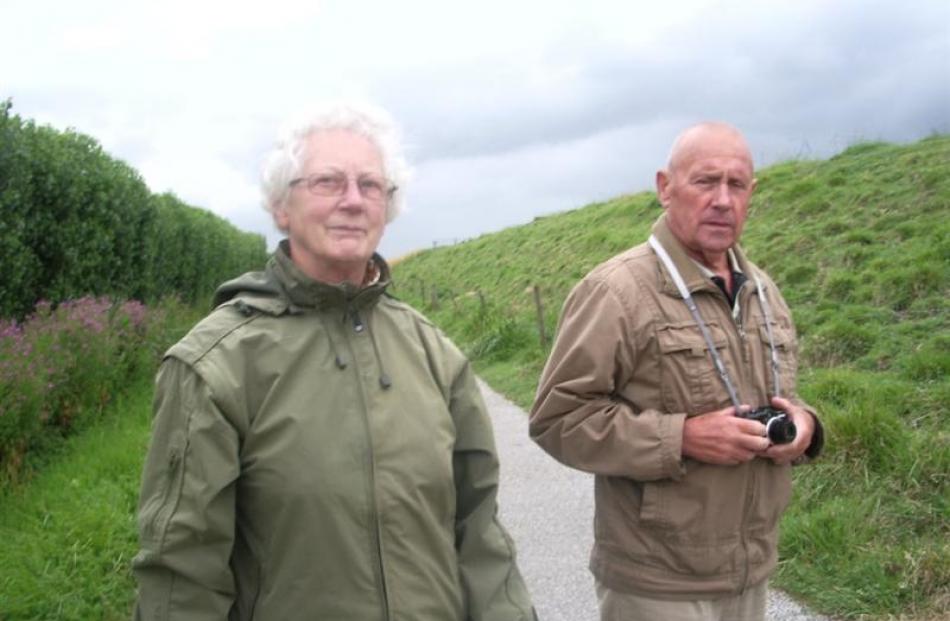A Dunedin family has vowed not to give up on its quest to have a "remarkable Dutchman" honoured by the New Zealand Government.
Seventy-year-old retired shoemaker Johan Verhagen lives in the Dutch village of Krabbendijke and has devoted his life to keeping alive memories of airmen from around the world who died liberating Holland during World War 2.
In the case of Dunedin lawyer Frazer Barton, that has meant his uncle James Barton is still remembered in Holland 65 years after he died, when the Royal Air Force Lancaster bomber of which he was navigator crashed near Mr Verhagen's village.
"It's hugely comforting for the families back here . . . that sacrifice is being appreciated still . . . and someone like Johan is right there. He's in the thick of it. He's responsible for it. So it's been an enormous contribution on his part."
James Barton was one of nine children and grew up in the Presbyterian manse in Gore.
He was a stock agent before joining the RNZAF and he eventually joined the RAF 626 squadron based at Wickenby, in England.
In May 1944, RAF bombers were deployed to strike at various targets in anticipation of the invasion of Normandy by allied forces.
Mr Barton (21) was one of seven crew on board his Lancaster.
The pilot was Colin Marriott, whose family also has Dunedin connections.
They were on their 13th mission, heading for a significant German-controlled railway junction at Hasselt, in Belgium.
Frazer Barton says the aeroplane was attacked from below by a German Ju 88 night fighter.
On a recent trip to Holland he spoke to an witness about what happened next.
"He told me how he saw the night fighter single out this Lancaster and he observed the exchange of gunfire between the two planes.
"He watched the desperate struggle and we can guess the Lancaster would have been turning and banking to get its underbelly away from the German and to bring its own guns to bear.
"The old man explained how he watched the German gunfire strike the wing of the Lancaster, and flames erupt.
"Those flames quickly engulfed the plane and it started descending, mortally wounded.
"He watched and hoped that he would see figures jumping out but no-one was to escape the inferno.
"The plane, which was, of course, fully laden with almost six tonnes of high explosives, was on a collision path with the heart of the village.
"If it had crashed there, many innocent people might have been injured or killed.
"The pilot must still have had some degree of control, because the plane turned, avoiding the village, and came down a few hundred metres away, striking a dyke when there was an enormous explosion."
Fifteen other aircraft were also shot down that night.

Over many years, he gathered comprehensive records of all wartime crashes in the Netherlands, visited schools in the area to educate children about the sacrifices that had been made, and visited memorials to ensure they were maintained.
He also sought out the relatives of those who were killed.
One of his letters arrived in Gore in the 1970s, long after the Barton family had left the town.
The letter was passed on to James' brother, The Rev Alex Barton.
Many members of the aircrew's families, including Frazer Barton, had enjoyed the hospitality of the Dutch village and been invited to attend wreath-laying ceremonies.
"Here was I, a mere nephew born 16 years after that dreadful night, receiving expressions of thanks for the sacrifice made by someone I had never met. It was very emotional."
Two items were salvaged by the Dutch from the wrecked Lancaster - the logbook and an axe.
The axe is now on display in the RNZAF Museum, at Wigram.
The Barton and Marriott families considered Mr Verhagen's work deserved recognition and in 2003 an approach was made by George Barton QC, of Wellington, to then prime minister Helen Clark.
A dozen approaches to government since then have failed to deliver any sort of recognition.
A spokeswoman for the honours secretariat in Wellington said this week that usually about 700 nominations for honours were submitted to the executive council and 200 were chosen.
No reason was ever given for why honours were not awarded.
She said New Zealand honours were only infrequently awarded to citizens of other countries, but it was not unheard of.
An Italian had recently received an award for his contribution to the merino wool industry.
Mr Barton said the family has now approached the New Zealand Returned Servicemen's Association for support in its bid for recognition of "a remarkable Dutchman".
mark.price@odt.co.nz













